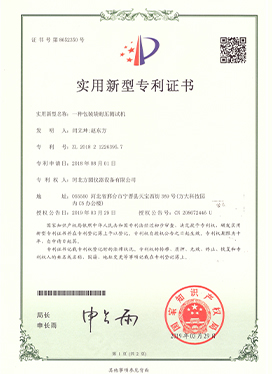Manufacturer of Cable Flexibility Testing Equipment for Quality Assurance Solutions
The Evolution and Importance of Cable Flexibility Test Machines
In the modern world, the reliance on electrical and electronic devices is more prominent than ever. As technology continues to advance, the demand for cables that can withstand various environmental stresses has increased dramatically. This brings us to a crucial aspect of cable manufacturing the flexibility of cables. The importance of testing cable flexibility cannot be overstated, and this is where cable flexibility test machines come into play.
What is a Cable Flexibility Test Machine?
A cable flexibility test machine is a specialized piece of equipment designed to evaluate the flexibility and durability of electrical cables. These machines subject cables to repetitive bending and twisting motions to simulate the physical stresses they will encounter in daily use. By doing this, manufacturers can ensure that their products will maintain performance and safety standards under conditions that mimic real-world applications.
Types of Cable Flexibility Test Machines
Cable flexibility test machines can vary widely in design and functionality. The most common types include
1. Bending Test Machines These machines use specific bending angles and cycles to test cable endurance. They typically have adjustable fixtures to accommodate different cable sizes and shapes.
2. Twisting Test Machines Designed to assess the ability of a cable to endure twisting motions, these machines rotate the cable at designated angles and speeds to evaluate the integrity of the internal conductors and insulation.
3. Combined Bending and Twisting Machines For a comprehensive assessment, some manufacturers offer machines that can simulate both bending and twisting at the same time, providing a more holistic view of the cable's performance capabilities.
Importance of Cable Flexibility Testing
1. Safety Assurance Safety is paramount in the electrical industry. Faulty cables can lead to short circuits, equipment failure, or even electronic fires. Cable flexibility testing ensures that cables can bend without breaking and continue to function safely over their intended lifespan.
cable flexibility test machine manufacturer

2. Quality Control Manufacturers utilize flexibility test machines as part of their quality control processes. By verifying that each batch of cables meets strict standards for flexibility and durability, companies can minimize the risk of customer dissatisfaction and product returns.
3. Regulatory Compliance Many industries are subject to regulations regarding product safety and environmental performance. Regular testing helps manufacturers comply with these regulations, avoiding costly fines and potential legal issues.
4. Market Competitiveness In a highly competitive market, producing reliable and flexible cables can be a significant differentiator. Companies that invest in cable flexibility testing demonstrate their commitment to quality, which can help bolster their reputation and attract more customers.
Selecting a Cable Flexibility Test Machine Manufacturer
When it comes to choosing the right manufacturer for cable flexibility test machines, several factors should be considered
- Experience and Expertise Look for manufacturers with a proven track record in the industry. An experienced manufacturer will understand the specific needs of different cable types and how to test them effectively.
- Customization Options Each type of cable may have unique requirements. A good manufacturer should offer customizable solutions catered to the specific testing needs of their clients.
- Technology and Innovation The best manufacturers invest in new technologies. Machines equipped with advanced sensors and data analysis capabilities can provide more accurate and meaningful testing results.
- Customer Support Adequate customer support is crucial for maintaining testing equipment. Ensure the manufacturer offers comprehensive after-sales support, including training, maintenance, and servicing.
Conclusion
In conclusion, cable flexibility test machines play a vital role in ensuring the quality, safety, and performance of electrical cables. As technology continues to evolve, so too will the need for rigorous testing standards. Selecting a reputable manufacturer to provide flexibility testing equipment is essential for companies aiming to produce high-quality cables. By prioritizing cable testing, manufacturers not only safeguard their products but also contribute to the advancement of safety and reliability in the electrical and electronic industries. As the demand for flexible, durable cables grows, so does the importance of these testing machines in sustaining innovation and quality in the market.
-
Why the Conductor Resistance Constant Temperature Measurement Machine Redefines Precision
NewsJun.20,2025
-
Reliable Testing Starts Here: Why the High Insulation Resistance Measuring Instrument Is a Must-Have
NewsJun.20,2025
-
Flexible Cable Flexing Test Equipment: The Precision Standard for Cable Durability and Performance Testing
NewsJun.20,2025
-
Digital Measurement Projector: Precision Visualization for Modern Manufacturing
NewsJun.20,2025
-
Computer Control Electronic Tensile Tester: Precision and Power for the Modern Metal Industry
NewsJun.20,2025
-
Cable Spark Tester: Your Ultimate Insulation Assurance for Wire and Cable Testing
NewsJun.20,2025
 Copyright © 2025 Hebei Fangyuan Instrument & Equipment Co.,Ltd. All Rights Reserved. Sitemap | Privacy Policy
Copyright © 2025 Hebei Fangyuan Instrument & Equipment Co.,Ltd. All Rights Reserved. Sitemap | Privacy Policy
